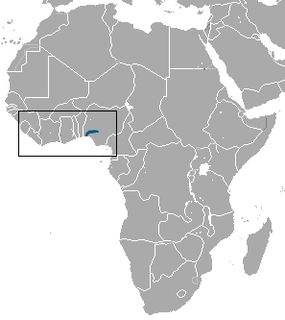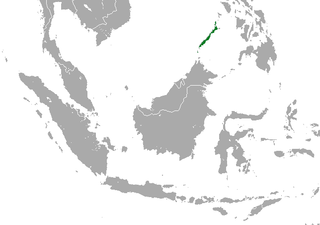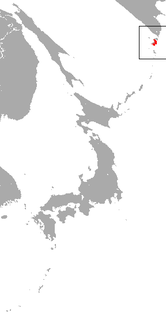
An IUCN Red List Critically Endangered (CR) species is one that has been categorized by the International Union for Conservation of Nature as facing an extremely high risk of extinction in the wild. As of 2021, of the 120,372 species currently tracked by the IUCN, there are 6,811 species that are considered to be Critically Endangered.

A species that is extinct in the wild (EW) is one that has been categorized by the International Union for Conservation of Nature as known only by living members kept in captivity or as a naturalized population outside its historic range due to massive habitat loss.

Villa's gray shrew is a shrew native to northeastern Mexico, where it is called musaraña.
Amolops tuberodepressus is a species of frog in the family Ranidae that is endemic to China. Its natural habitats are subtropical or tropical moist montane forests and rivers. It is threatened by habitat loss.

The Somali hedgehog is a species of mammal in the family Erinaceidae. It is endemic to Somalia and Somaliland. The Somali hedgehog is nocturnal.

The Bornean water shrew is a species of mammal in the family Soricidae. It is endemic to Malaysia. Its natural habitat is rivers. It is threatened by habitat loss.

Crocidura grandiceps is a species of mammal in the family Soricidae. It is found in Benin, Ivory Coast, Ghana, Guinea, Liberia, Nigeria, and Togo. Its natural habitat is subtropical or tropical moist lowland forests. It is threatened by habitat loss due to agriculture and aquaculture as well as logging and wood harvesting. To increase habitat protection for the C. grandiceps, in-place land/water protection conservation actions are in place. The vernacular name large-headed shrew is sometimes applied to C. grandiceps but has also been used for the entire related genus Paracrocidura. The IUCN List categorizes the C. grandiceps as Near Threatened as of 2008.

The Andaman spiny shrew or Andaman shrew is a species of mammal in the family Soricidae. It is endemic to India. Its natural habitat is subtropical or tropical dry forests. It is threatened by habitat loss.

The Palawan shrew is a species of mammal in the family Soricidae. It is endemic to the Philippines and known from Palawan and Balabac Islands, from sea level to 1,300 m (4,300 ft) asl. It occurs in old growth and scrubby secondary forest. Habitat loss (deforestation) is a potential threat to this little known species, although it seems to tolerate habitat loss and modification.

The Ugandan lowland shrew is a species of mammal in the family Soricidae. It is found in Kenya and Uganda. Its natural habitats are subtropical or tropical swamps and subtropical or tropical moist montane forest. It is threatened by habitat loss.

Babault's mouse shrew is a species of mammal in the family Soricidae found in Burundi, the Democratic Republic of the Congo, and Uganda. Its natural habitat is subtropical or tropical moist montane forests. It is threatened by habitat loss.

The Paramushir shrew is a species of mammal in the family Soricidae. It is endemic to Russia. Its natural habitat is temperate forests. It is threatened by habitat loss.

Day's shrew is a species of mammal in the family Soricidae. It is endemic to India. Its natural habitat is subtropical or tropical dry forests. It is threatened by habitat loss.

The Sakeji horseshoe bat is a species of bat in the family Rhinolophidae. It is endemic to Zambia. Its natural habitats are subtropical or tropical dry forest, subtropical or tropical moist lowland forest, and moist savanna, especially Zambia, Mwinilunga District, Ikelenge Pedicle between the Sakeji and Zambezi rivers, approximately 11 km NNE of source of Zambezi River, Kavunda, 11°17'S, 24°21'E, 1,388 m. It is threatened by habitat loss. It was discovered in 2000.
Polyommatus dama is a species of butterfly in the family Lycaenidae. It is endemic to Turkey. Its natural habitat is temperate shrubland. It is threatened by habitat loss.
Liparis bautingensis is a species of plant in the family Orchidaceae. It is endemic to the Hainan region of southern China.

A vulnerable species is a species which has been categorized by the International Union for Conservation of Nature that is threatened with extinction unless the circumstances that are threatening its survival and reproduction improve.

The Amazonian brown brocket, also known as the small brown brocket, is a small species of deer that is almost entirely restricted to South America.













